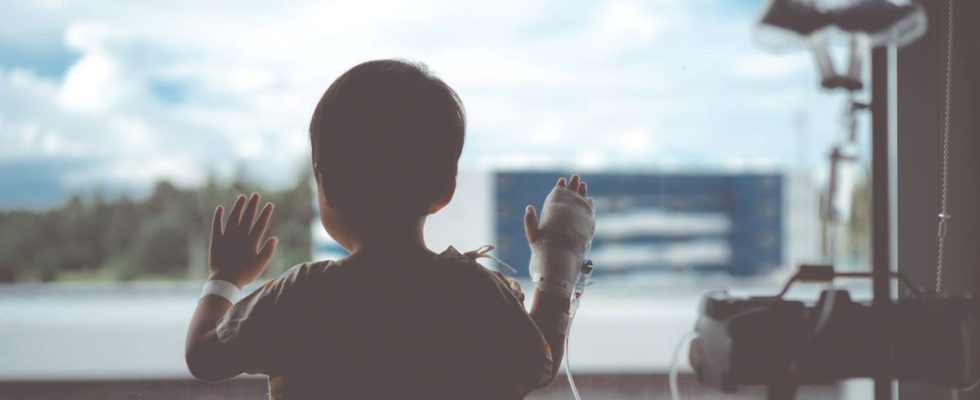Published on
Updated
Reading 4 min.
This Thursday, April 25, the documentary “Contrepoisons, a citizen fight” will be broadcast on France 3 Pays de Loire. Directed by Jean-François Corty and Valéry Gaillard, it traces the fight of the Stop Aux Cancers de nos enfants association, after the appearance of 25 cases of pediatric cancers in the town of Sainte-Pazanne and its surroundings.
On Thursday, April 25, in the second part of the evening, the documentary “Contrepoisons, a citizen fight” dedicated to the fight led by the collective “Stop our children’s cancers” will be broadcast. Doctissimo interviewed Marie Thibaut, the president of this association and Dr Jean-François Corty, humanitarian doctor, vice-president of Médecins du Monde and co-director of the film.
Marie Thibaut: The collective was born in March 2019, following the appearance of several cases of pediatric cancer in the town of Sainte-Pazanne and its surroundings, in Loire-Atlantique. In 2015, my son Alban was affected by leukemia. I realize that he is not the only one and that cases multiply over time, whereas pediatric cancers are normally rare. I alerted the ARS in 2017, which contacted Public Health France. In July 2018, with six sick children, the health authority spoke of a “cluster”, that is to say a grouping of cases in a given geographical territory. Before retracting some time later. The epidemiological investigation carried out, which we contest and which triggered anger and incomprehension on the part of the parents of sick children, concluded that it was impossible to identify a “common cause” for these cancers. Obviously, since they are multiple, in our opinion.
What hypotheses do you put forward to explain the situation?
Marie Thibaut: Several elements are certainly responsible for the situation. With genetic causes excluded, we suspect several environmental factors such as phytosanitary products, radon and electromagnetic waves. A polyexposure, in short, which is not really studied by the health authorities. Because at present, we analyze the toxicity of an element acutely, but not on chronic, long-term exposure.
Dr Jean-François Corty: Hypotheses are difficult to put forward, there probably exists what we call a “cocktail effect” between different elements. We know that only 10% of cancers have a genetic cause. In 90% of cases, toxic substances and multiple exposure through this “cocktail effect” can be precisely the cause. We are clearly observing an increase in cases of pediatric cancer, with 2,500 children affected each year and around 500 deaths, even if the existing registers are not necessarily up to date. But in practice, it is difficult to highlight a “cluster”. On the one hand because we do not have the capacity, in real time, to monitor these cases precisely and on the other hand because the institutions do not prioritize this situation as being a health emergency.
Dr Jean-François Corty: There are other places in France, near La Rochelle, in Eure or in Haut-Jura where cases of multiple pediatric cancers have been noted.
Marie Thibaut: The number of affected children – 25 in total for the Sainte-Pazanne sector – that I name are those that I only know. Otherwise, it’s families who contact me. My data, listed on the Stop Children’s Cancers website, is therefore not exhaustive. This would require a real partnership with the Loire-Atlantique/Vendée cancer registry. Moreover, their data would benefit from being kept up to date and made public. For the other regions of France, it was parents, whistleblowers, who were able to contact me via the collective.
Dr Jean-François Corty: We currently lack resources in the field of prevention, which is why I wanted, as a doctor sensitive to health, social and environmental inequalities, to participate in the realization of this movie. Furthermore, the creation of the Citizen Institute for Research and Prevention in Environmental Health by the collective, which brings together local residents, scientists, polluters, local elected officials… around the same table, makes it possible to move forward on these essential questions.
Marie Thibaut: With the creation of the Citizen Institute for Research and Prevention in Environmental Health, we want to create the scientific literature that is lacking on these issues and set up a sort of health democracy to make science understood by everyone. This involves, for example, analyzes of hair, air, water, soil, etc. Because at present, political decisions are disconnected from scientific reality and citizens. While prevention is essential and we can act, as citizens, from the territories concerned. Do you know a lot of people, people who know 25 children affected by cancer?
What can you do as a parent to best protect your children?
Dr Jean-François Corty: Difficult to answer this question. I would emphasize the importance of individual measures, such as practicing physical activity, choosing an organic diet or living far from agricultural crops or the ring road, which are polluted areas. Unfortunately, not everyone has the opportunity to do this…
Marie Thibaut: I advise all parents to act within their reach, on a daily basis. To avoid cleaning products and cosmetic products that are harmful to health, to favor organic products while avoiding pesticides as much as possible, to protect the health of children as much as possible. To find out what actions to take, I recommend the mini-guides from ASEF, the Association Santé Environnement France, which are a wealth of information for the general public, in order to protect themselves from these everyday pollutants.
